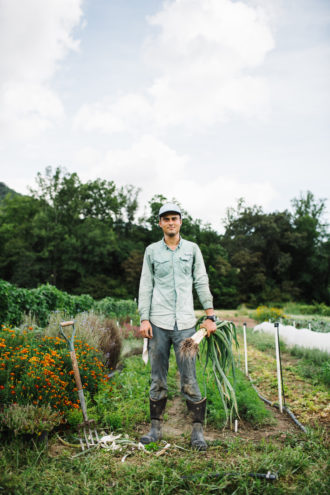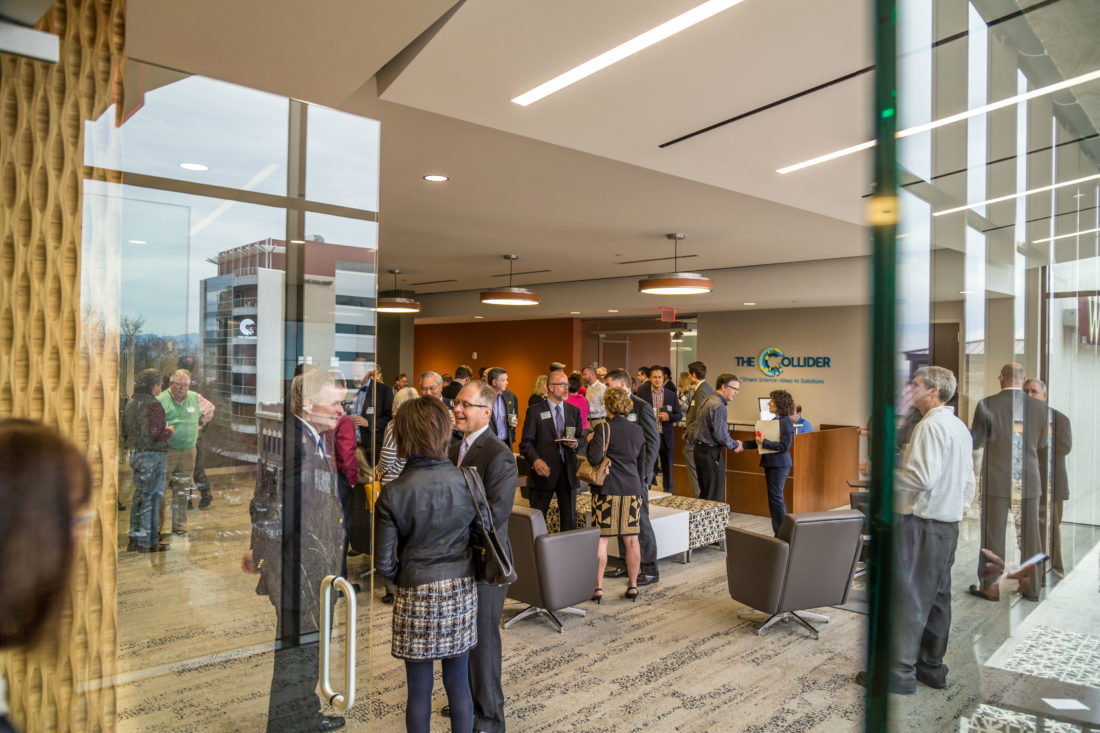Josh Dorfman, CEO of The Collider in downtown Asheville, knows that many of the world’s biggest companies in the food and beverage industry are thinking about climate change. Drought, extreme heat, unusual rainfall events — the business leaders easily list their hazards and express their concerns. And that, he says, is a problem.
Climate awareness itself is valuable, Dorfman clarifies. But too often, the corporate attitude he encounters is solely focused on some undefined future and disconnected from the data he constantly observes coming from the nearby Asheville headquarters of the National Centers for Environmental Information.
“I think there’s more on the line than many people understand. Because when you’re close to the data and you’re close to the science, you understand that the climate is already changing,” Dorfman explains. “You’ve got risk in your business today.”
On Tuesday, Oct. 23, the [Food + Beverage] Collider conference will bring together representatives from local, national and global companies that have started to make the move from thought to action. By creating connections among these leaders, Dorfman wants to build momentum for resilient responses to climate change.
The conference takes on added importance in light of the most recent Intergovernmental Panel on Climate Change report, released on Oct. 8 (avl.mx/5cx). The report notes that extreme weather and rising sea levels have already resulted from a 1-degree Celsius increase in global temperatures; only “rapid, far-reaching and unprecedented changes in all aspects of society,” according to an international coalition of 91 scientists, would limit warming below 1.5 degrees.
“It’s like the playing field that everyone’s playing on — that the economy’s playing on, that companies are playing on, that the government’s playing on — that playing field is starting to erode,” Dorfman says.
A step ahead
[Food + Beverage] Collider, Dorfman says, will not focus on climate change mitigation strategies such as moving to alternative energy or using recyclable packaging. Those actions, while critical for the planet’s coming decades, don’t address the risks that companies face in the present. “This is not the conference where we put people on stage and say, ‘Tell us your solution to climate change,” he emphasizes.
Instead, The Collider has brought in business representatives who are adapting their operations to stay successful in a changing climate. Dorfman points to speaker Nick Troiano, commodity research manager and lead meteorologist for candymaker and food conglomerate Mars, as an example of this approach. Troiano creates long-term weather forecasts for areas that grow products such as peanuts and tree nuts, thus helping his company avoid expensive disruptions to its manufacturing.
Other speakers include Greg Lowe, global head of resilience and sustainability for consulting firm Aon; David Kuhn, relationship manager with the World Wildlife Fund; and Svante Persson, senior operations specialist with the Inter-American Development Bank. Two attendees — Kim Ionescu of the Specialty Coffee Association and Meredith Taylor with Counter Culture Coffee — will discuss the caffeinated crop Dorfman calls “the canary in the coal mine” for agricultural businesses.
The Collider cast a wide net for this lineup, Dorfman notes, because companies with proactive climate strategies are rare. He shares what he says is a typical story of a COO for an unnamed “very well-known food company,” who lamented his business’s inability to procure its usual California almonds due to drought. While the executive was annoyed, he found another temporary source before resuming business as usual.
“‘We know [climate change] is out there, but until it starts to impact our bottom line, we’ve got other things to worry about,’” Dorfman recalls the COO saying. “The awareness is there, but it hasn’t fully translated into ‘This is risk caused by climate change that’s going to cost you money unless you deal with it.’”
Here and now
Local involvement in the conference comes mostly through a series of pre-event field trips to companies such as French Broad Chocolates and New Belgium Brewing, scheduled for Monday, Oct. 22. The Collider calls Asheville “Climate City,” Dorfman says, partly because such businesses share a “cultural ethos” about climate change and environmental impact. “There’s a deeper commitment to showing that business can be a positive force for good, and that’s the kind of company we want to expose visitors to,” he explains.
Sarah Fraser, sustainability specialist with New Belgium, says her tour for conference attendees will highlight the company’s LEED-certified buildings and energy-efficient brewing equipment. But she will also discuss how the campus’s very presence in Asheville is itself a conscious response to climate risk.
New Belgium’s original brewery is located in the relatively arid climate of Ft. Collins, Colo., Fraser notes, and water is the most important ingredient in beer by volume. After a series of droughts in the Western United States, she says, “I think we realized our second brewery needed to be in a place where hopefully that’s not going to happen for us.”
Additionally, locating in Asheville somewhat reduces New Belgium’s exposure to changes in fossil fuel prices or regulation. After the company commissioned an analysis of carbon emissions for its flagship Fat Tire ale, Fraser says, it found that transportation to East Coast markets was a major contributor. The brewery’s newfound proximity to those markets saves roughly 2 million shipping miles per year.

In Weaverville, attendees will be able take a farm tour with Evan Chender, better known as The Culinary Gardener. At his intensively cultivated single acre, the restaurant-oriented grower wants food company executives to get acquainted up close with the challenges climate poses to small-scale producers.
Chender says this year has been particularly difficult for his farm due to the huge amounts of rainfall dumped by the remnants of Subtropical Storm Alberto, as well as Hurricanes Florence and Michael; climate change is likely making tropical storms wetter and more intense, according to the National Oceanic and Atmospheric Administration. He also references multiple years of unusually cold winters, which have complicated his efforts to grow crops year-round.
“The lack of normalcy in climate is something that I’m very aware of,” Chender says. “I think no one can really have enough exposure to the real effort involved and the struggle — the constant struggle — in producing high-quality vegetables and herbs and flowers in an organic system on a really small scale.”
Weighing the scales
Chender isn’t exaggerating about the size of his farm: The Culinary Gardener operates with three total employees. By contrast, the Mars meteorologist attending the conference works for a company with a headcount of over 100,000 people spread across more than 80 countries. Yet it is the smallest businesses, suggests Executive Director Lee Warren of Asheville’s Organic Growers School, that lie at the heart of climate resiliency.
Warren, who is not involved with the conference, points to a 2013 report (avl.mx/5da) by the United Nations Conference on Trade and Development titled “Wake Up Before It’s Too Late.” The report calls for a widespread shift away from large-scale agriculture toward local, regenerative production. Such methods could increase carbon storage in agricultural land, reduce reliance on outside fertilizers and cut waste throughout the food system.
“The underlying truth of all of this is that soil is everything,” Warren says. “Who’s going to tend to soils? It’s going to be people who are in love with their land, who are in love with their communities, who are in love with all that it means to be of place.”
National and global corporations, Warren argues, aren’t prepared to make truly major shifts to their production models. While some big companies might enact incremental changes like moving from synthetic to organic pesticides, she says, they are reluctant to abandon single-crop fields or embrace soil-building practices that might slow the short-term pace of growth.
“Shifting significantly is what we need to do, and the big systems don’t shift significantly. They don’t shift quickly,” Warren says. “I feel like the local, the small, the grassroots, can really affect a lot of change, especially if consumers get onboard.”
Dorfman sympathizes with those values, saying he often personally chooses to patronize local food businesses. But with the global food and agribusiness sector valued at over $5 trillion, he believes it’s unrealistic to expect massive changes overnight. By encouraging all businesses, including large corporations, to gradually shift in response to climate change, Dorfman and The Collider aim to smooth the transition to a new type of food economy.
“What happens if some of those global companies disappear? It doesn’t mean necessarily that the world that one envisions or hopes for is what you get,” Dorfman says. “We try to help organizations of all sizes adapt and become resilient. Because the downsides of not doing that are way too severe for us to throw our hands up and not engage.”
Long row to hoe
Laura Lengnick, former director of Warren Wilson College’s sustainability education program and owner of consulting firm Cultivating Resilience, says all companies can play a role in climate adaptation. While not involved in the conference, she notes that the role of corporations in particular will involve a re-evaluation of business as usual.
“Those companies that are genuinely investing to build wealth and improve natural resources and increase human capacity at the local level are part of the solution,” Lengnick explains. “That has not been the pattern of corporate behavior. It’s more been exploit, extract and accumulate wealth within the company.”
According to resilience thinking, Lengnick says, distributing resources more evenly throughout a system protects the entire system from failure. Translated to agribusiness, that could mean more equitable sharing of profit between the companies that process food and the farmers that grow it. With additional funding, she suggests, farmers would be better prepared to bounce back after climate disturbances.
Chender notes that The Culinary Gardener has already experienced difficulty adapting to climate change due to shortfalls in capital. A drainage project in his fields to handle more intense rains, for example, ate up roughly half of his profits for the year, reducing his flexibility in other parts of his business. He says it’s sometimes hard to prioritize sustainability when the money gets tight.
Even New Belgium, with an estimated revenue of $225 million in 2015, has yet to reckon with all the potential impacts of climate change on its business. Fraser recalls how, in 2014, unusually warm and wet conditions in Idaho led to barley — the source of malt for beer — sprouting in the field at harvest time, which made it unsuitable for anything but cattle feed.
“If that had happened in consecutive years, or if it happened in multiple places where barley is grown, it definitely could’ve led to a shortage,” Fraser says. “I think we’re thinking about that; I don’t know that we’re quite there with ‘What are we going to do about it?’”
Lengnick urges not only companies, but also governments, to move beyond thinking on climate change. “There is too much effort to just protect the system that we have now. I think we need to get much more courageous about the signals we’re giving to society,” she says. “Take what we know and get started. It won’t be perfect, and that’s OK.”
At The Collider, Dorfman hopes the conference will inspire just that sense of action. But where such changes will take the world, he says, remains unknown. “I don’t know how that ultimately plays out. Does the economy look the same 50 years in the future as it does now? Unlikely.”



Wait!!! SO now the business community is saying climate change is real!!?
DOES THIS INCLUDE THE FOSSIL FUEL INDUSTRY???
GOP??
Weather has been a factor for farmers for all time. Just think of the farmers who till way many more acres than the one acre restaurant garden nationwide …
You are correct about weather as perennially unpredictable, but human activity is now making the climate itself something other than a given. NASA has a good primer about the differences between the two: https://www.nasa.gov/mission_pages/noaa-n/climate/climate_weather.html